
Featured Student Work
Each week, we highlight the thoughtful work of our class.
Enjoy the work of our featured writers–from current and previous semester–below.
Fall 2022
Coming soon…
Fall 2021
Paper 3: language ideologies
Makes & Adobe Spark
Aram’s song “Conversation”
Golden Lines from paper 1
“Now this not only gave me encouragement about my writing, it also helped me realize that one person’s truth is subjective and just because one person thinks the way I communicate is ineffective it doesn’t mean it really is” – Aram
“I became a stranger to a language that I knew well and everyday that passes it feels more and more foreign to me.” – Jocelyn
“My mother is from Arkansas, and we grew up knowing which fork to use, not to put elbows on the table, and the importance of “may I” – Grace
“Language was a barrier, but also a gift.” Selena
“These programs suck, respectfully.” Vicky
“…people assume I am detached from my heritage because I am considered a ‘mixed child’. But, the only thing that’s detached is the language barrier between me and my cousins.”- Gabby
“At that moment I was embarrassed and couldn’t remember how to ask so I made it a point to always try and retouch up on the basic words or everyday uses.”-Rosemary
“Language is a powerful tool; it has the ability to make you feel like you’re on top of the world and it also can take you to the lowest of lows.” Hannah
“She says I’m fluent in Spanglish and she’s not wrong” – Soraya
“I understand the professionalism in it but when you’re having a simple conversation with someone and they decide to correct you, it just ruins the whole conversation” – Kiana
“I completely just don’t care what anyone says or thinks of me when I speak because at the end of the day why does anyone’s opinion matter?” – Antonette
“The American school system has forced me to learn english in order to “succeed” when the United States of America literally has no official language.” – Alexa
“That is why now, I choose to prioritize both the Spanish and English language because if it wasn’t for one or the other I would not have been able to accomplish the things I have.” -Daniela
“My mom is from El Salvador and my dad is from Marin county, but they are both bilingual. My sister and I ? Not so much.” -Sofia
“I always thought I was just broken.”-Emmaline
“It wasn’t a healthy way to learn how to write because now that I’ve been given freedom to write how I want, I feel lost in a sense due to the constant helicoptering of my teachers over my papers” – Alex
“Even so, sometimes I spent hours in the library studying to try to be the perfect student, who doesn’t understand assignments in English because the words were too confusing because my teachers in middle school were too focused on helping me pronounce words correctly, instead of showing me the “educated words.”’ Sandra
“For now as I struggle to hold on to my voice in not one but two languages I will speak as loud and proud as I can since I now know that there is nothing to be embarrassed about” ~ Chantel
“My type of languages are English, Spanish and very straight forward.”- Diana
“Speaking a certain language and way all really seems to depend upon the circumstances of the place or situation encountered.” – Angelica
“All in all, I have realized that I have to be content with this reality as it is the ultimatum that I now face.” -Ahmad
“It instills the concept that in order to be successful, smart, or creative in America, you have to speak, act, and write formally in English which puts a large majority of our society at a disadvantage.” -Selena
“I have to put in the effort and dedication to improve and I will improve.” -Yazmin
Spring 2020
Marc Mercado’s short film, “Querido Chico State,” with Sandra Carbajal, Guadalupe Cruz, and Diana Gutierrez.
Our Golden Lines, selected from our peers, from our first paper exploring our languages:
“Taking a language away from a community and choosing one language to dominate would make communication between people and countries easier, but the authenticity of that region would completely be gone.” -Puneet
“It’s as though American’s ideals of colonization and theft were taking place in my mind.”-Marc
“Language is a beautiful way to communicate and we shouldn’t feel uncomfortable when someone speaks a different language than us, but rather encourage it.” -Leslie
“My experience with language at school is that coming into school the Spanish had to go. Especially when I was little because while being at home I was just taught Spanish and I remember a numerous amount of times many of the words I was learning at school in English would clash with the words I knew in Spanish, so there was pressure of somewhat letting go of a language to fully retain the other.” -Angie
“The only place that I was able to talk English was at school but even then to me it felt like it wasn’t enough since I was in the course of “bilingual.” -Jackie
“I grew up in a less fortunate neighborhood so slang was something we used a lot and we did not sound super grammatically correct when we spoke.” -Hannah
“Everyone has a slang or way they talk to people and how they act with their body language. Slang will not be going anywhere and feels like it also depends on what generation you are in.” – Michael
“There is always gonna be people who judge you [about speaking spanish], you just have to learn to be comfortable with who you are to not care.” “Choosing when to shift languages is just something that happens naturally. I just get a feel for the place I’m in or the people I’m around and then from there I choose if I want to speak Spanish, English, or Spanglish.” -Diana
“Yes, I don’t speak spanish. Yes, I’m a hispainc woman refuses to speak spanish. But both my race and language barrier does not define me. I define me.” -Monique
“I write whenever I have something on my mind or whenever I feel like I can’t say anything out loud.”- Karina
“I am self conscious about my dialect and wonder if I sound ‘hood’ or ‘ghetto.’” – Cyrus
“I rarely struggled with my Spanish classes as I struggled with my English classes and I think that this is because I grew up speaking another primary language that isn’t English” -Vivan
“It’s interesting how even as little kids we do a lot of these things unconsciously almost as if it’s in our nature to adapt to situations”-Rokee
“Personally for me, being bilingual has shaped the experiences that I have gone through during my life and my likes and dislikes.” -Veronica
“I’ve never been cautious of when to speak a different language, because I’m proud that I’m bilingual.”- Jessica
“It is a bit too much to say that I care too much about what people say about me so I try and act, and look as best as I can so that people have a positive view about me without even knowing me personally.” -Johanna
“I believe that there should not be just one way that everyone should speak because language says a lot about someone’s race, culture and even background so I think that if everyone had to speak the same language there wouldn’t be any diversity among humans. “ – Daisy
“I think there shouldn’t be only one way everyone speaks because everyone is different and I think language is part of someone’s culture which everyone should be proud to represent.” – Evelyn
“If someone that I know talks to me in Spanish I like it. I feel more comfortable with the person if I am talking to them in Spanish.” – Monica
“I realized how much I communicate with my roommates and friends with Spanish more than I do in English because in a way it reminds me of home and it reminds me the reasons why I came to study somewhere else.”- Lesly
“Here is one way I transition between that because I have to make sure that I don’t say an improper word in Spanish when speaking with my father since I was taught to always be respectful and proper with adults.” – Lizbeth
“Therefore, I was treated as an outsider and a troubled child because I couldn’t speak like the rest of the kids, because I couldn’t communicate with the people around me like everyone else, because my accent, dialect, and speech wasn’t an exact copy-and-paste version of the kids next to me. “ – Erick
“When I am around my Latinx friends, I love to speak Spanglish, loudly, and positive. I sometimes have some “hood” terms slip my tongue, but its a slang I bring with me from my hometown. Then I switch it up when I am with some new suburban friends that I know would be scared if I spoke to them like my Latinx friends.” – Guadalupe
“I don’t think there is one way everyone should speak because sometimes you have to speak differently in order to show deep emotion or any kind of emotion.”- Sandra Carbajal
“There are times when I sometimes go to a store and accidentally add spanish words when I am speaking English, and it’s embarrassing.” Juan
“Even though when I went into school I knowing how to speak english and read the basics since it was the start of my school career. Then I would be pulled out of classes to rad things to them and to describes picture and to write words they wanted me to and in a way it made me feel if I was dumb.” – Elizabeth
From Spring 2018 (focus of the course: Digital Culture & Identities)
Portions of the student work were published in two articles:
Featured papers: thank you all for the work on your drafts and revisions. The mentors and I learned so much from your research about DACA, social media, representations of underrepresented groups in the media, #blacklivesmatter, car culture, gaming, immigration, gun control, hip hop, and so many other rich and important areas of research. We want to highlight the work of a few of these drafts by sharing papers authored by Andrea Vickers, Ashley López, and Hoanna Ramirez. Thank you for sharing your work.
 Hoanna Ramirez
Hoanna Ramirez
Digital Literacy and Evolving Countries
The revolution of digital literacy and technology has impacted first world countries. The skills that we learn change the way we see people, the way we process information, the way we communicate, the way we share stories: it provides us unlimited amounts of free knowledge, and most importantly, it keeps us connected. This basic tool and skill has given us access to everything we currently know and love. Now, this understanding of technology’s impact led to my ultimate research question: who is being left out in a digital age and how we can get everyone on board? This question helped me ground my focus on developing countries. I began to read about how developing countries have made an extensive amount of progress with a limited supply of cellphones and computers. I continued to dig further and began to read about others who are unable to have access to the digital world because of local tensions, environments, and financial situations. I became very interested in this topic. For instance, I discovered changes like providing internet in secluded areas and how that changes the people who reside in these communities. I read about a small town earning their high school diplomas and how that opened new opportunities for the fellow graduates. I also understood that the gender gap in these countries is a major problem. Men are the only priority and this limits women to be able to get out of their homes and find a different role rather than being a caretaker. What I believed to be a basic tool, and often a tool that is taken for granted, is truly life changing in other countries.
Looking back to my childhood, I remember feeling frustration that my mom never had the opportunity to get an education. Her story read like many of the stories I read in my research. At a young age, she needed to give up school because there was not enough money to further her education. She worked with my grandma cleaning up a hotel near the city. With no clean water, electricity, and a job that barely made ends meet, her life was limited. Eventually my mom made the decision to leave home and come to Los Angeles with the belief that she would be able to take care of her family back at home. While there was so much to learn, she found that life in Los Angeles was extremely different. Her introduction to the internet was momentous. This tool gave her access to nearby job opportunities, find apartments for rent, learn a bit of English, and she was able to locate resources around the city. This easily accessible information is what changed my mom’s life and what I ultimately believe will change everyone’s life. The only problem is that not everyone has an equal opportunity to this tool. When I was exposed to the issues underdeveloped countries face, I felt extremely saddened and alarmed. This is what led me to believe that it is not enough just to understand the adversities these people experience. Rather, it is our duty to challenge each other through conversations, express beliefs and be empathetic. If we stay silent, then we will continue to permit conditions to remain the same or worsen throughout time. I believe we need to extend these resources so that the people can have new ways to lead their lives.
There have been many different approaches to start conversations about developing countries. We all have an understanding about how impoverished these countries are. We also understand that people flee their countries due to political turmoil and seek safety in other regions. I often think that people think it is enough to just know the facts but I must argue with this. It is not enough to just know the surface of a problem; we need more involvement and to make personal connections. I feel that developing countries are portrayed as something incurable. Others are quick to judge and believe that the civilians in these countries are savages, a burden, and even unchangeable. When you often read an article explaining you the conditions of places like Kenya or Guatemala, they often are portrayed with horrific photos to make the audience believe that there is nothing more than violence, drug activity, thieves: false interpretations. The problem with not representing people with dignity is that it clearly shows the lack of knowledge about the topic. In “Creating Culturally Sensitive Solutions to Digital Violence,” Elizabeth Losh interviews Jacqueline Wernimont, a professor at Arizona State University and someone who researches online violence. Wernimont argues that sometimes “People who are privileged often create more harm than good.” This means that people often have the best intentions but don’t understand the realities of a particular community. She goes on to say, “Often time people can be blind to certain issues. Therefore the responsibility to educate and empower the people of her race and expose them to the harms of the internet.” I believe this is important because the only way to know the truth is to do your own research and not believe everything that is being presented to you.
Take in mind that developing countries that face destitution have a major problem with a gender gap. This means that women often do not get to explore opportunities that men do. This is upsetting because women also deserve the same chance to become engineers or take the role of the opposite gender. In the article, “Digital Literacy in the Developing World: A Gender Gap,” the authors talk about the disadvantages and injustices that developing countries face daily without the internet. It explains that many women of color are illiterate and have many kids because they are not given the chance to get an education. This is the fault of our system who keep the rich in power and keep the poor silenced. On top of that, most developing countries do not accept women to have power or have people of the trans community be leaders. This is the reason why there is such a gap between the genders. Even in these countries men are given more opportunities to education and job options than women. The article then continues to show examples of projects and programs created by women who are given these same resources. For example, the one that stood out to me most was the “She Will Connect” program that promotes digital literacy to women. The women selected were taught how to read and analyze the content that was being presented to them. This is crucial because when we allow others to get an equal opportunity we create incredible programs. When we strip someone’s voice, we are robbing the world of new ideas that stem from others’ experiences. I believe if we continue to extend our knowledge to others we can create open and safe communication to those who live in fear or are being robbed of their basic rights.
An example of how powerful digital literacy is in developing countries is the story I read about Dadaab. An organization called Nethope posted the story about a refugee camp in Kenya called Dadaab. This refugee camp is one of the fourth largest camp in Kenya. The article, “High Speed Dadaab Networks Connect Refugees to Family, Support, and Opportunities,” lists the reasons why people flee their countries. Some of them include social and political conflicts, intense famine, and seeking for safety. When the refugees arrived at Dadaab, they felt at home. While there were scarce resources in job, educational, and communication opportunities, the camp had a major shift in 2012. This all changed when companies like Microsoft and Intel provided the camp with digital equipment. This window allowed them to make friends with others, reunite or talk to family, and it gave the people the opportunity to get a high school and college diploma. On top of that, once they acquired their diploma, the system even trained them for possible internships outside of Kenya. This resulted in a major change for the people in the camps; it gave them hope and a new possibility. The people at these camps use these skills for positive change. Having access to the internet will help the people to be aware of the existing problems. This is important because educated people discuss problems and they are less susceptible to fall for old ideologies. When I read this and think of the future outcomes, I’ve come to believe that this can eliminate existing problems developing countries have. By educating themselves they can exterminate the gender gap, misogyny, poverty, and create new social justices that are more inclusive. I just find it unfortunate that a basic resource like the internet isn’t as accessible as it should be.
Change happens when we all as citizens take the time to educate ourselves and form our own opinion. As participants in this digital culture, I believe we need to take the time to follow groups like She Will Connect in order to show our support for underdeveloped countries. The reasons we face problems in our society today is because we do not take the necessary steps to voice our opinion. The issues we face with digital literacy are prevalent because if we can’t take steps forward then we cannot eliminate the limited conditions people live in.
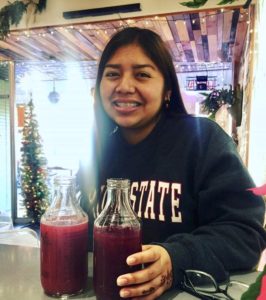 Ashley López
Ashley López
The Invisible Silhouette of the Latina
The image for Latinas in the world in which we reside is a silhouette that feels set in stone. As a result of this, we who identify as Latina many times see this image as something impossible to reach. I identify as Latina myself, specifically Mexican, and have been born and raised in the United States, and I am still a little confused with what it truly means to be Latina. Some of this confusion is due to what I have grown up seeing in the media. I remember as child really enjoying the movie Maid in Manhattan, where Jennifer Lopez stars as the lead role, and being teased about it by my sister and mother. They didn’t understand why I enjoyed that movie so much, and truthfully, neither did I. But, as I have gotten older and in conducting my own research, I assume it is because she is someone who I could relate to because she was not white. From magazine covers to television advertisements I have seen an absence of Latin presence. For this reason, I have became hungry to learn more about how it has affected and continues to negatively affect our young Latinx community.
A key factor in the misrepresentation that I have found is the film industry. America is known to be very diverse, many times referred to as a “melting pot,” but although America does consist of people from all around the globe, it is still a very black and white America. “(Mis)Representation of Latinos in Media” discusses how in the world of entertainment in the United States, Latina women are constantly not being represented in the film industry, and are specifically misrepresented. Latina women usually are not in any important roles in films. When cast, they almost always are playing roles that dumb them down, sexualize them, or portray them as maids. Some people may argue these types of productions are “simply a film,” but the reality is that it is a bigger problem for the young Latinx generation in the United States. When people think of Latina women, they automatically picture a certain image in their minds, many times sexualizing them. Some examples of this are: Jennifer Lopez, Sofia Vergara, and Salma Hayek.
Having only minority women of color constantly being portrayed as the help in films is a form of psychological wage (Du Bois). Psychological wage is something that we as a society are surrounded by and are simply unaware of. Forms of psychological wage are newspaper discussions, speeches, scientific analysis, novels, sermons, and songs that emphasize whiteness as a natural benefit. The way Latina women are being portrayed in the media is a way to convince them and even confirm the stereotypes that are placed upon them. It shows white women in higher political, educational, and social statuses and portrays that Latina women do not hold positions of power, which leads to them believing they are incapable of holding these positions of power.
Sam Dolnick, in “Plastic Surgery Among Ethnic Groups Mirrors Beauty Ideals,” explains that the most popular procedure to perform on Dominican women in the borough of Manhattan, New York is on their buttocks because “they all like the curve.” The tone of the quoted doctor above gives me the impression that to him “they” (minority Latina women) are simply a means for more money for themselves. They most likely know what is going on with body issues in regards to Latina women but still do not acknowledge it because it does not apply to them. I feel that the use of the word “they” shows how society is exclusive towards Latinas. This comes to show that many women feel the need to have a certain body image to live up to what it truly means to be a Latina woman. This source claims Latina women who ask for surgeries usually ask to look like famous Latina celebrities, like Mexican singer, Talía, which brings us back to the issue of lack/mis representation of Latin females.
Famous minority women are often portrayed as “hot,” which sometimes makes people believe this is all a Latina can be. We need to understand the influence of celebrities on women to see how it is slowly dehumanizing women in society. Financial insecurity is already an issue in minority communities, still these women feel pressured to keep up with the image of being a “Latina” as portrayed in the media and get plastic surgery. Dolnick states women, “Can also find a growing number of doctors offering layaway plans to help them afford operations. If the price is still too high, illegal surgery by unlicensed practitioners is available in many neighborhoods.” Therefore, unlicensed people take advantage and perform illegal and many times unsanitary procedures, which can have bad medical side effects. Having women go to these extremes should be a red light, but still, it is an issue that is not addressed. Another way that this issue is reflected is through the loyalty Latinas have to the beauty industry. They turn to the beauty industry to make themselves as similar as possible to the ideal “beautiful” woman. One should not wish to change their physical appearance simply because they feel they have traits that are not beautiful to the world.
Identifying as Latina in a country that does not necessarily value your presence is hard, but becomes even harder when the world you live in has a set mindset on how you should act and look. For me, being Mexican plays a huge role in who I am, but many times when I set foot outside of my home I feel like I am stepping into another world. I walk out of my home and do not see anyone I can relate to on magazine covers or advertisements. I hear the president say hateful things about my people: the people who are simply trying to better themselves doing jobs no one else is willing to do. Aside from this, being female plays also plays a role because as a society women are often looked down upon. Typically, women are seen as weak, and for this reason it is our duty to show female minorities we are just as capable as males. There is no one look for a woman who identifies as Latina, just like any other race. Being Latina means more than having a “nice” body and being “feisty.” The Latinas who are shown for our young generation to look up to should not be all they strive to be. I only say this because half the time, the Latinx people in the media are being portrayed through a very negative stereotypical lens. Because of this we need to teach our young girls that there is no need to dumb yourself down in order to be accepted in this society. Although this issue is a political issue, it is also a very prevalent social issue.
In “Brown Beauty: Body Image, Latinas, and the Media” Milton Stokes and his co-authors have research that supports the idea that the body image issues in regards to Latinas is due to misrepresentation. There are sources implying that when body image studies are being performed, they are specifically focused on Caucasian women. Despite this, the source states, “BMI is the strongest correlate of body disturbances; the higher the BMI, the greater the body disturbance is for Latina women.” The researchers quote Schooler and Lowry who claim that young Latinas show the most desire to achieve the Eurocentric ideal. Due to this, adolescents have been reported to have a desire to lose weight in order to fit the European ideal portrayed in the media.
This ties back to the lack of representation: young Latinas are not seeing people to whom they can identify with, and therefore, believe they must change to be like the people who are portrayed in the media: “Latina adolescents express a desire to achieve the same Eurocentric thin ideal and that adolescents try to lose weight at the same rate reported by Caucasian female adolescents” (Stokes et al). Being Latina, I feel that this makes total sense because many Latin mothers comment on whether their daughters are too thin or not thin enough. Yet, when they begin to gain weight they comment on how they should cut down on their food intake.
Being Latina is also being stuck in two worlds, which is difficult to balance. Many times young Latinas feel the need to meet certain beauty standards for their native culture and for their American lifestyle they currently live in. Being surrounded by different ethnicities is beautiful, but not so much when you see different ethnicities and races being valued, with the absence of your own.
Andrea Vickers
Police Brutality and The Black Lives Matter Movement
As a young, black African American, it is devastating to watch the news. It is excruciatingly painful to focus on crimes in America because the majority of them result in people with my skin color dying. Innocent people. People who came here for freedom and justice. People who thought America could provide them with a brighter and better future. But growing up in this country did nothing but prove to me that no matter where I go, I will always have a master; I will always have to succumb to someone because of my skin color; I will always be a target and I will always be considered as an animal. I live in a country where our protectors are the ones killing us and wiping us off one by one without any consequences because it is what it is and I don’t have the power to change the system. I don’t have the power to stop the cruelty and brutality that’s enforced on us by the government. Everyday is a new game of chess where, as an African American, I will always be a pawn, weak and powerless. So no matter how many times we recite Martin Luther King’s words, nothing ever changes, and no matter how many time we listen to Frederick Knight, we will always be a target. And no matter how hard we try, they will never be able to understand that our families are dying because the police justice system refuses to acknowledge the fact that our lives matter too.
Frederick Knight, activist and a voice for The Black Lives Matter movement, talks about police brutality and how the government needs to make stricter laws against police brutality. Police and law enforcement play a critical role within the African American community in the United States. There are numerous cases, year after year, regarding police brutality and all we can do is ponder when will it end? After Trayvon Martin? Tamir Rice? Terence Crutcher?
On November 22, 2014, Tamir Rice, was a 12 year old boy who was sitting at a picnic table bench under a gazebo, when a officers arrived at scene. Tamir walked out of the gazebo as the police car drove onto the grass and Loehmann, the police officer, got out. Within seconds later Tamir was shot dead. Another innocent child killed, another child taken away from their mother, and another childless mother created over this systematic institutionalized racism bullshit. There’s been a total of 250 different cases regarding police brutality in 2017, which makes me wonder, am I next? All of those cases matter and we need change: from the introduction of new policies in local police departments to the election of district attorneys who are willing to aggressively prosecute police for their crimes. Since 1833, African Americans have been battling to reduce police violence in America, but we are fighting a battle that has been rigged, because for the majority of those cases, we lost a person and yet their killers are still out there being given another chance by the system to kill another one of us. It is fair to say, as Shaun King argues, that we are “being outspent, out-organized, and out-maneuvered by an unjust system that is so deeply entrenched and so well fortified with the principles of white supremacy, racism and classism that in spite of all of our collective efforts, injustice marches on.” As minorities in this country, we understand that the system is unfair when it comes to our rights; for years we’ve been fighting the same war and for years we keep losing that same war because as minorities we don’t have a voice in America. As African Americans, we don’t have a say when it comes to how we should be treated. We can’t ask for justice without fearing for our lives. America is considered to be a free country but in reality we are not as mentally free as we are physically. We might not be picking cotton and chained, but our minds are being controlled by the system. Our soul is still tied to slavery and no matter how hard we try we will never be free until the white man decides that we are and that is a problem.
As a young African American woman, it would be a shame for me to not take a stance when it comes to the issue of police brutality, seeing as lately it’s been affecting people with my skin color the most. I used to always think that the police department was here to help our community stay safe. Their job was to protect us. They’ve got the training and the gear, but lately it seems as if we’ve become a target for them based on the amount of people who have died due to the brutality of police. We could talk about this all day. We could take weeks to talk about how unfair or unjust the system is, but that’s nothing new. We could take weeks to talk about how in 2015 alone 37% of victims of police brutality died as a result of the brutality at the hands of police officers. And we could also talk about how “nearly 1 in 3” of those people were black and unarmed despite the fact that black people only make 13.3% of the population in the U.S. We could talk about how there were 104 cases of black people killed by police officers and we could ponder about how “only 13 of the 104 cases in 2015 where an unarmed black person was killed by the police resulted in officers being charged with a crime.” We are upset at the fact that even though black males “between the ages of 15 and 34 make up 2% of the U.S population, more than 15%” of those deaths we caused by police, making “their rate of police-involved deaths… five times higher than for white men of the same age” (Statistic of Police Brutality In the United States). We could protest about how it is time “to tear down the barriers of systemic racism that are in the criminal justice system” because it is clear that they’re not only destroying our country and communities, but also depriving our children from a better future and the opportunity to expand their potentials (“How to End Institutional Racism”). But talking isn’t making any change in the system.
Talking isn’t protecting our children from the brutality, and it is not signifying how important black lives are. Talking about the problem didn’t save Tamir Rice. It is not acceptable that a young boy should lose his life because an officer was not good enough to do his job. And it will never be ethical that anyone should lose their life because of their skin color. It is time to stop the stereotypes and it is time to start believing in the black community because these children have potential and must be given the opportunity to expand that potential and create a future for themselves. There is no right solution to the problem. Enforcing gun control is an issue that takes time and these kids do not have that. It gets to the point where not even the constitution can help; there’s the Eighth Amendment, which forbids “cruel and unusual punishment,” and yet the death rate due to police brutality is rising. Along with The Eighth Amendment and The Fourth Amendment, which is supposed to protect citizens from “unreasonable police mistreatment,” (U.S. Supreme Court Justice Antonin Scalia on July 27, 2012 in Washington, D.C.) and yet again this is still an issue that needs to be solved. In other words, if the government can’t protect the people then what is their purpose?
We have The Black Lives Matter movement and it has been the one thing that we can call our own, the one thing that’s been our anchor and helping us channel our anger and energy towards the system. But the system refuses to let us have ownership over anything because they started protesting that it should be “All Lives Matter,” but what is it that they don’t understand? They haven’t given us a single reason as to why we, African Americans, should care about “All Lives Matter” when we don’t get that same sense of generosity from them? Why should we care when it is not “ALL” lives that are being taken? We can’t wait any longer and our patience is wearing out. It’s 2018 and nothing has changed. The system did not get better so therefore they have no right to question the importance and significance of the BLM movement. They have no right to judge because we’re still waiting for that day when a young black male can be walking in the streets at night with a hoodie and not be identified as “suspicious.” Martin Luther King once said, “For years now I have heard the word ‘Wait!’ It rings in the ear of every Negro with piercing familiarity. This ‘Wait’ has almost always meant ‘Never.’ We must come to see, with one of our distinguished jurists, that ‘justice too long delayed is justice denied'” (Letter From Birmingham Jail).
And he is, without any doubts, absolutely right about that.
This isn’t about black people being selfish; it’s about black people trying and fighting to get the rest of the world to understand them. They’re not asking for white police officers to start getting killed and they’re definitely not blaming the whole white community for this issue. We just want to be heard. We want to be taken seriously and we want justice because our lives matter too. We are tangled up in a system that’s targeting minorities and if that isn’t unconstitutional then I’m not sure what is.
Make Cycle 3: Featured Makes!
Immigrants’ Rights website by Ashley, Amna, Allison, and Nina from Group 42
#TheFighters from group 44
Make Cycle 2: Featured Makes (chosen by their peers)
Veronica Beltran’s Google Slides “Who Am I”

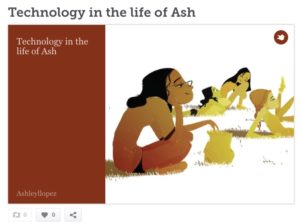 Ashley López: “Technology in the Life of Ash”
Ashley López: “Technology in the Life of Ash”

 Shane Mitchell: “Tweet in the Woods”
Shane Mitchell: “Tweet in the Woods”
 Peter Yang: “Instagram Journey”
Peter Yang: “Instagram Journey”

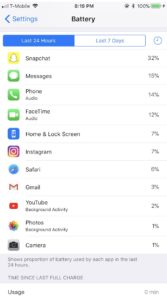 “I feel like this really represents me and what I stand for because I use my phone every day, almost all day. As one can see I use Snapchat primarily because all my friends are on there and none of them really text me just snap me instead. I am a real friendly oriented person and this app shows my best side of connecting with people especially my friends back home, 9 hours away. My least used is the camera but this means I still use it. Although I was surprised that it’s only 1%, I feel that 1% covers a lot because I know for a fact I love to take pictures and take videos. This screen shot really defines me outside the box.” —Carlos Guevara: “Snapshot”
“I feel like this really represents me and what I stand for because I use my phone every day, almost all day. As one can see I use Snapchat primarily because all my friends are on there and none of them really text me just snap me instead. I am a real friendly oriented person and this app shows my best side of connecting with people especially my friends back home, 9 hours away. My least used is the camera but this means I still use it. Although I was surprised that it’s only 1%, I feel that 1% covers a lot because I know for a fact I love to take pictures and take videos. This screen shot really defines me outside the box.” —Carlos Guevara: “Snapshot”
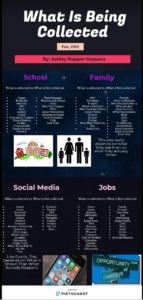
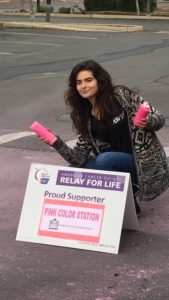 Ashley Napper-Vaquera: “What is Being Collected”
Ashley Napper-Vaquera: “What is Being Collected”
Alejandra Ramirez Bermudez: 
Make Cycle 2: Summary work with Audrey Watters’ “The Weaponization of Education Data”
 Ashley López: Weaponization Through Algorithms
Ashley López: Weaponization Through Algorithms
“The Weaponization of Education Data” – written by independent scholar Audrey Watters – provides many points of views in regards to the data being collected by the federal government and educational institutions. In the world that we reside in, it is simply necessary to have our personal information collected in order to do things like attend a university. But the real question is if collecting this personal information is really necessary. Are the institutions that we are providing our information with using it in the most professional and discreet ways possible? According to Audrey Watters, the answer to this question is no. There are a number of ways that data is being used to undermine our personal freedom and upward mobility. Watters focuses on three major points in her article: Education Technology in a Time of Trump, Algorithmic Discrimination, and Education Technology and School Surveillance.
Watters begins by explaining to the reader how in her previous years she would have been able to write an article on the topic of data insecurity, but now in our modern times it is much more complicated than that. She states that there are many incidents of personal data being stolen in the departments of education. Although many incidents do occur in the education systems, Watters believes that this issue extends beyond education technology. She proposes this because according to the article “The Verge: 143 Million Compromised Social Security Numbers,” over 140 million Social Security Numbers and other personal data have been stolen in a data breach at Equifax. Then she continues to inform the reader about how education technology has immediately changed under the Trump administration. Watters explains how the data of people who are undocumented in this country is leading to them being targeted. She claims that their immigration data is being weaponized. This is lamentable because many of the immigrants who are being tracked down with their immigration status information are scholars, tireless parents seeking better lives for their children, and even doctors. They too make up the future of America, which is why it is essential that institutions only ask for necessary personal information. This is crucial, specifically for undocumented people in this country because giving someone your legal status could potentially change your life forever. I believe Watters does a great job in making sure that we as the readers understand that once we put our identities into someone else’s hands, there is a chance that they will use it as a weapon against us. After discussing this touchy subject, she ends with informing the audience about algorithmic discrimination.
We all know that discrimination exists in our everyday life, workplace, and in politics. However, we do not stop to realize that there is discrimination occurring in algorithms, which are essentially the key segment of computer programs. Although Audrey Watters’ article is full of knowledgeable information in regards to weaponization of data, the topic I found most interesting was algorithmic discrimination, which is one way that data is being used to track our every move. According to the article “Should Big Data Be Used to Discourage Poor Students From University” written by Asha McLean, which is linked in Watters’ article, McLean states that an algorithm using government data in Australia is being used to discourage students from low income socioeconomic backgrounds to attend universities. According to the article: “Should big data be used to discourage poor students from university?” there have been groups of people who have created programs that will literally tell students, “Well based on your socioeconomic background and your parents history etc you won’t do very well at university … or your odds are low” after putting in their personal information. This comes to show how low income minorities are being discouraged to pursue higher education simply because of the world they come from. This is a form of discriminating against people who do not fall into the category of “eligible” to attend a university. Because being “eligible” usually means being more wealthy, this means that in the future the poor will stay poor and the rich who have always been on top, will stay on top. A handful of data should not be able to say whether or not you can or will attend a university. Sadly this is our reality.
After reading some background information of Audrey Watters on her blog and reading her article “The Weaponization of Education Data” I have become eager to learn more about the types of writings she does. When she describes herself in her blog she does it in such an honest way that it makes me want to personally meet her. She describes herself in a plain-speaking tone, which allows the reader to hear her true voice. In the same way she describes herself, she writes “The Weaponization of Education Data.” She communicates to the reader the major concerns that we all as global citizens should be worried about in regards to putting our personal information into someone else’s hands. Personally I enjoyed this reading because it was something that I could relate to, being a student and a person from low socioeconomic background. Therefore, I found all of Watters’ information interesting and helpful. Now that I have read this article I will be more careful to whom I am giving my personal information to. I also enjoyed reading this article because it reminded me of the many roles that algorithms is having in our society. I, of course, was already somewhat aware of the things that Watters discusses in her article, but reading it has kept me in check and reminded me of the world I live in. It has been a wake up call and reminded me why I came to Chico. I have come to pursue a higher education and make my parents who have gave me the world proud, so that one day I could give them the world. For this reason I will not let an algorithm be correct in predicting my success at here at California State University, Chico.
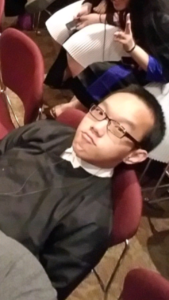 Alex Xiong: A World Run by Capitalism
Alex Xiong: A World Run by Capitalism
“I won’t be another statistic,” a phrase that I remember from the recent movements and events happening in the last few years, from the Black Lives Matter movement to a number of movements, events, and statements. In my mind that phrase never really applied to me until reading the article. That article being “The Weaponization of Education Data” written by Audrey Watters. In her article, she argues how data that is collected today “[can] be weaponized” and can be used against us (Watters Paragraph 9).
She first starts off with the multiple breaches in big corporations, such as Equifax and Yahoo to name a few in the recent years. With these hacks, it left some hundred thousands maybe more, exposed to identity theft. She argues that this a huge problem because if major corporations can be breached, how can school systems keep personal data, such as our SSNs, out of the hands of someone with an malicious intent: As “schools are simply not prepared to [answer] the cybersecurity threats” of today (Watters Paragraph 3). She explains that there have already been breaches in education technology that left some millions of people vulnerable to attack. One of the examples showing how our data can be used against us are the recent ICE raids. Audrey explains that because of the data collected by schools, they can make “inferences based on the data that’s available” (Watters Paragraph 18). They use the data they collect on people and to determine if that person is a citizen or not. The data collected can also be used in another way: Discrimination. Tech companies can do this through data compilations and algorithms to sort us into groups. For example, school systems can sort students into groups that were “supposed” to fail with the very same algorithms, setting up those students for failure, already assuming their fates are pre-determined. Her arguments in the article she writes shows how exposed we are in the digital age, as we constantly being tracked 24/7. In this day and age, we are just another statistic for others to take advantage of.
One of the articles she pulls evidence from, that she links to in the her article, is called “Educon 2.9 and ‘Student Voice’ or ‘Finding a Glimmer of Hope in a Time of Chaos’” written by Chris. In the article, he argues that his students, who are millennials, have more to them than meets the eye. He explains how millennials are often stereotyped as being “awful” but they aren’t the only problem with the world (Chris Paragraph 4). As he explains, they aren’t the ones wrecking and destroying the planet. This article supports Watters’ arguments because it showcases how some people feel like they are set up to fail. As she explains, the fear of getting set up for failure is a very real thing especially with all the data collection going around. Some people are stereotype as failures because of the upbringing or performance. Millennials can find this extremely relatable because we are categorized as an awful generation. As Simon Sinek explains, we’re “accused of being entitled, narcissistic, self-interested, unfocused, and lazy.”
I think Watters’ article and arguments are extremely compelling. The data collection is a very complicated situation. I’m actually really scared of it as our personal information can be turned in a gun pointed at our backs. Even now we are vulnerable to anyone with a malicious intent, because of school, work, my bank, to name a few, who have a whole bunch of personal information that people can use for identity theft. Of course there are a lot of benefits to data collection. However, I think the the negatives of it overwhelmingly outweighs the positive. The government uses data collected on a person for public safety, watching and taking anyone they deem dangerous. But, like Rey from Star Wars once said to Luke: You can’t assume one’s destiny when you foresaw their fall to the dark side. As their destiny is not set in stone. When thinking about this during my workshop, the data collection topic kept leading to one place for me: It is the fact that our society is a capitalistic one. One can say if you want more money find out what other people like doing so you can profit off of it. But how can our society function as a capitalistic one when how hard we work doesn’t matter. Does it mean the hard working lawyer work less harder than a hacker?
 Kinnah’d Hughes
Kinnah’d Hughes
While reading Audrey Watters’ article, I received her argument to be about our education system and how the government goes above and beyond to track certain things now, even though the majority of it doesn’t need to be tracked. I was a bit confused throughout the article, but the part that I found most interesting was the section about Education Technology in a Time of Trump. Throughout this section of Watters’ article, she mentions a very important situation in my life, specifically for the people I care about, which was about the DACA and immigration situation.
Watters’ starts this section by talking about Donald Trump, and how his first order as “President” was banning all refugees. That was a huge effect on America and our immigrant students because “the order had an immediate effect on scholars and students, many of whom had returned home over the holidays and were stuck outside the country – some even stranded mid-transit” (Watters). Another result to Trump making this horrendous decision was that many international and immigrant students were affected in the school system as well. For example, a group of girls from Afghanistan on a robotics team were all denied their visas to get to the US to continue their competition. Though you would think those two effects were bad and hurtful enough, those weren’t the only effects of Trump’s actions that Watters’ mentioned. She continued to inform us about two more important situations which were: ICE and DACA.
ICE is the U.S. Immigration and Customs Enforcement, and I would like to mention they are a group who, before this “President” that we have now, I have heard nothing about. But since Trump’s leap to strengthen the country’s border, ICE has been on a rampage. They’ve been arresting high numbers of immigrants, even some who “did not fall into categories previously targeted by law enforcement – they did not have criminal records” (Watters). This went too far to where parents were taken away after taking their children to school and even one student, Diego Ismael Puma Macancela, was taken away just hours before his own prom.
Watters’ continued on with her point about this outrageousness by next mentioning a new situation with Deferred Action for Childhood Arrivals (DACA). DACA is a way for American Immigrants, like my best friend, who were brought to America illegally as little children to be able to grow up and get an education here. According to the Hechinger Report last updated September 5th, 2017, about 800,000 students are protected through the DACA program. About 800,000 students who are most likely still immigrants, because of this simple minded country making it hard for them to get legalized, are protected under this amazing program, which Trump planned or plans to end. This section of the article continued with Watters’ expressing how all the data collected from DACA students, which should have remained in privacy in my opinion, could possibly be an effect with the deportation of them or someone really important to them.
I thought this article overall was amazing, and it gave us great information that our country would have probably liked to keep quiet, so I am very grateful for it. Once I finished reading this article it left me feeling very irritated with this country that we call “Land of the Free.” It left me with the thought that we cannot in any way shape or form call ourselves that, while we constantly kick out people for wanting nothing but a better life for them and their family.
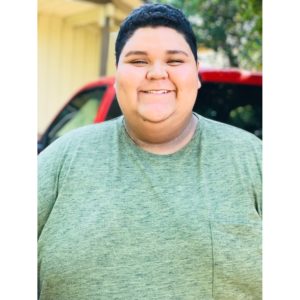 Horacio Romo-Robles
Horacio Romo-Robles
In the article “The Weaponization of Education Data” by Audrey Watters, many different things were specified but the main points that stood out to me were insecurity on the internet in school, immigration, and the Trump Administration. During her arguments, she explored the different schools that had data security issues, where they got hacked and they got information taken away. She listed various schools and had different information of the school. After discussing the data insecurity, she went on to talk about immigration and how families were getting separated from their parents just because of a simple travel ban or a law that had been implicated. In the same frame as immigration, she went on to discuss the DACA program and the education of individuals. This is when she transitioned into talking about Trump and how he had all these different travel bans and had all these ideas on immigration, education, and people’s uses of technology as to where schools are tracking and keeping information recorded of many students.
A link that I followed from the article has to do with travel bans:“What You Need to Know About Colleges and the Immigration Ban.” It has to do with an executive order that Donald Trump put in work that bans refugees from entering the United States. It didn’t only affect the people trying to come in but it affected another seven majority Muslim countries. During this travel ban prompts were given to colleges to see what they thought this travel ban was going to do and how they were going to be affected. According to the article, “Of the more than 15,000 international students who are directly affected by the order, roughly 12,000 are from Iran”: that statement has a big impact because many Iranian citizens that were just trying to reenter the country to keep going with their education were refused their entrance because of the travel ban. After implicating stats on affected people, they went into thoughts of colleges and how they were responding. They stated that many would be affected financially, education wise, and stability. At the end of the article they discussed what was next to be seen and they indicated the following: “On Saturday, a judge issued a nationwide stay that prohibits anyone currently in the United States from being deported under the order.”
My thoughts on these two articles are different because one talks about one specific thing and the other one opens to a much broader discussion. I believe that having many concerns about what goes on is good to a certain limit. Like it’s good that Watters worries about data insecurity and all these other things because what if my kids, or yours, or a relative’s kids go to these schools. You might not want them to keep track of everything or you might not want them to do all these tests on them to get information. Basically, if you can avoid something, I’d be better. On the second article I touched on, travel bans are something that is going around a lot right now, and it’s something that many of us should be aware of because of our immigrating families, friends, neighbors, etc. For me it touches me because both my parents migrated to the country and even though they are both legal we still fear that something will happen to them.
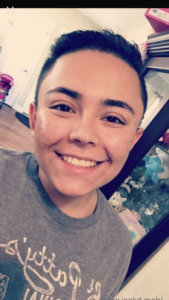 Jordan Fuentes
Jordan Fuentes
While reading the “The Weaponization of Education Data” by Audrey Watters, I like how she describes the important roles that the internet and its IT services offer, and how they’re completely unprepared when it comes to being able to defend themselves from malicious attacks such as ransomwares and cyberattacks. I clicked on one of the links, which led me to “Brewer School System Still Dealing With Effects of Recent Cyber Hack” by NBC Maine; there was a part that caught my attention because it began to talk about a cyberattack on a school system in Maine which would call parents with the automated voicemail saying that they were going to harm their kids. I found that part interesting so I decided to look more into it. The reason being is because I wanted to know if there was a solution to these attacks. Unfortunately, there was no clear solution except hope, because these school districts would close the schools for weeks and open in hopes of the attacks being over.
While I kept reading the text, I found another part that caught my attention: it was the wannacry Virus because it was publicly announced that the US had declared North Korea the culprit for the effects of this virus. I then clicked the link in order to learn more about the topic, which led me to the article “U.S. Universities Race to Contain WannaCry Ransomware, Officials Say.” This article described how this virus affected three hundred thousand computers world wide and how the situation was handled. The way the virus works was by targeting computers that ran on a really old windows software that was extremely outdated: it would lock the computers files and ask for a ransom. Most of the time they did not release the information until the three hundred dollar ransom was paid. If it was paid in the following three days it would double the amount, six hundred dollars, and if the ransom wasn’t paid within the following seven days their files would be deleted from their systems. Fortunately, some of these companies have a backup system, which backs their data just in case of breaches. I personally believe that it is a temporary solution to a permanent problem because they can be continued to be hacked, but they back up their system, what is the purpose of it? If they, once again, have no protection from these malicious hardware. An idea that caught my attention was that some of these universities who were affected by this virus decided not to participate in the discussion about the topic; for example, “North Dakota State officials confirmed an infection had occurred but declined further comment.” I believe this may be the underlying cause as to why these schools are targeted because they are showing vulnerability. For example, if these companies decided to speak out they would realize that it could actually become a learning opportunity for many companies, schools, hospitals, and any location that has this kind of access. The way that these places could benefit from these potential situations is by studying the signs before hand of how the virus works and to better prepare for the attacks.
While analyzing the article “Casper College Looks to Amazon Approach to Customize Student Experiences,” by Autumn A. Arnett, something that caught my attention was that they described how the students could actually benefit from having these personalized profiles by giving them access to after hours check-ins or simply advice on any curriculars. This could benefit students by giving them these resources and having a better retention and graduation rate, which could prove to be absolutely life changing not only for the students, but for schools too, for these schools have “the ability to combine personalized learning with intrusive advising and allow students to customize their collegiate experiences based on their own preferences could be a game-changer.” To conclude, I believe the author has some very strong beliefs on how were coming into a new era of technology with little to no protection. These systems are becoming so integral in our everyday lives and hold valuable information why shouldn’t we become more self aware on how to become more preventative while accessing these services.
Make 1 Cycle: Featured Makes–In make cycle 1, we looked at the self, selfies and the quantified self. For our makes, we created artifacts that represent our identities.
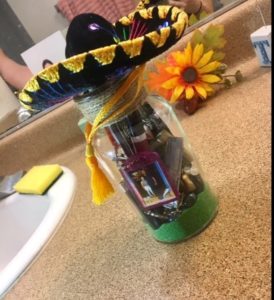
Veronica Beltran’s Video project:
Jacob Barrera’s “unbounded latino”
Who knew I’d be at Chico State one step closer to success
Or as I would say comin out the varrio
Throwin it back to elementary sketchin out the ol S
Me llamo Jacob n this how the story go
Grew up in a latino household about 8 deep
My dad the only one workin sometimes a struggle to eat
gettin home late he’ll sleep n have a cold beer
My moms in the kitchen cookin n gettin n his ear
Now the arguin start to happen n i gotta get my lil bros
Take em to the room so nun tryna get in they peepholes
I’m first born n I got a lot of sh*t growin up
But I can’t blame my parents for givin me they two sense
I’m grateful for what I have now so I raise my mid finger up
Cause I want my own dream fu*k a white picket fence
Growing up in the hood made me see n realize lots of stuff
Watch whatchu wear cause being outside can get rough
I didn’t even say I was from and that’s the San Fernando valley
A place where all you see are minority families
Now my family isn’t perfect but I love each and every one
We all got our ups and downs but It’s better than havin none
To me family is everything and I could say I’m blessed
But there are others out there who have none or less
Now what I brought to the table was a lil of my past
N will definitely be more as I get older
This the piece that I wrote for this class
And it sound like this poem is over
Manting Xiong film:
Daniela Galván’s film:
Week One Discussions: Featured Writers
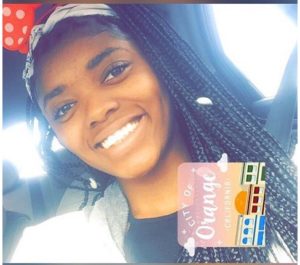 Danielle Collier
Danielle Collier
The article “Big Mother Is Watching You” took a while to draw me in. For a while I was just reading and reading to get the reading assignment done. As the article got into talking about the sleep tracking bracelets my attention was drawn in because my aunt and I were recently talking about the bracelet that she had. I thought hers was creepy because it was able to track the different times that she woke up throughout the night and what time it happened. We talked about how cool it was because the device was able to tell her how deep she slept. The watch subtracted the times she woke up throughout the night. The app later apprised her of the total calculations and displayed the levels of sleep she in the night. I was amazed, interested and creeped out all at the same time. I thought that the sleep wristband was advanced and was the most bizarre thing I’ve ever heard. Little did I know that sleep wristbands are old and technology is way more advanced than I knew.
The article opened my eyes by providing a timeline of the technological evolution from tracking steps with pedometers to tracing heart rates and tracking sleep levels. This article made me think of how advanced technology is today and that’s where my mind went on a tangent. I thought about how social media has advanced from little ole harmless Myspace, to Facebook, to Instagram to Snapchat to Twitter. I thought about how we just agree to the terms and conditions to install the app not knowing what we are really agreeing to. We allow these apps in our messages, photo gallery, call logs and recent searches not knowing that they have now webbed across our whole phone and have access to everything. This thought creeped me out and it brought it back to how allowing those same companies who track our phone and what’s in our minds how actually have access to our unconscious selves. We have allowed these companies access to our unconscious heart rates. Maybe I’m overthinking it or even too paranoid but I know that with this much access and power over someone they have the ability to do many things far beyond our knowledge.
Personally I don’t post anything personal on Facebook anymore, Instagram is used as a way to get my music out there and Snapchat I delete and reinstall every so often when I feel like I need a break from posting about my personal life every so often. I wish I could permanently delete social media and have their be no history of my accounts. I wish I could transfer all the photos that are meaningful to me in an online vault that isn’t all tracky tracky then use a regular old camera to document the moments I want to member. That way I will still be able to have the images that I want to keep close to heart and not be under the surveillance of whoever is behind the webcams, tracking social media accounts and now the people that have access to track our sleeping patterns and when we are unconscious.
 Ashley Napper-Vaquera
Ashley Napper-Vaquera
In the article “Big Mother Is Watching You: The Track-Everything Revolution Is Here Whether You Want It Or Not” by Anne Helen Petersen, there are many points that that she discussed about tracking things. Although of all the information gathered in the article but what stood out to me the most was the tracking device “MimoBaby. MimoBaby in my opinion is a little creepy, because of how they track babies patterns. I never actually realized the amount of work they do for apps like this, like specifically I didn’t even know that this is a thing. I just assume that mothers and fathers would prefer it, but I know they would need that personal moments with them instead of having some tracking device do it for them even though it would be easier on them. In my opinion, I don’t think I’d use this for my baby because it’s weird and it’s a must as a parent to do so don’t use a easy way out. But that is just my opinion; it may be fine for others or who knows I may even change my mind as time goes on and when I get a child. So basically I think if just depends.
Another point in this article that stood out to me was that by this year there will be 60 million fitness trackers in the world. 60 MILLION! Like why that many? And I’m sure there is more coming as time goes on. I find it fascinating that there is that many; I guess people need to find the right fitness tracker to fit them but I still think that’s a little excessive. “As of September 2014, $1.4 billion in venture capital funding has been directed toward the wearable and biosensing market; by 2018, wearable sales are expected to push $30.2 billion” (Petersen, Big Mother Is Watching You). The money does so well that they push for these trackers. They know that people want to be fit, and by finding the right app will be the start of them being fit. Personally for the times I have worked out, I prefer the free apps because they are still effective in achieving goals but some people want those apps where they offer more to get the results they want, so they’re willing to pay and that’s why the funding and business for it is good.
Right now the things I keep track of don’t compare to what were mentioned in the article. Some examples of the things I track are emails, text messages, eating, blackboard, and my phone battery. Those are some of what is important I need to do to get things done. I don’t track how much water I drink when I in fact probably should, I don’t keep track my steps but it is interesting to see how many I’ve done, and the amount of likes/views I could get on social media. The two points I’ve mentioned above are what stood out to me in the article and got me to think; not only think how about them as if I use them but for others too. I just stated opinions on the topics if I found them necessary or not. The MimoBaby is a little strange but if some people like it then good for them. The fitness trackers, hey I mean it’s a pretty good product to do and it gets money, you just need people to want that motivation to workout to use it. That’s all I got for this discussion.
Daniela Galvan
While reading “Big Mother is Watching You,” I was surprised by how much we track ourselves. It’s crazy how obsessed some people are with how much they want to know about their workout, miles and even pets. While I personally do see benefits to knowing how many miles I just ran with an app or about knowing about our sleep patterns, what I found the most interesting about the whole article was this quote, “Its not surveillance, after all, if you’re volunteering for it.”
Most people don’t realize that thy are volunteering to be monitored by the app or websites they willingly sign up for. I also don’t like how they are coming up with ways to track everything your dog does. The dog never volunteered to be tracked and while it may be helpful if the dog gets lost. I personally think its creepy to know when your dog goes to the bathroom or chases a cat.
Reading this strange Buzzfeed article has made me reflect on myself and on what I track in my everyday life. I am not obsessed with tracking my followers or likes but I do notice when I get less likes on certain pictures. I guess in a way I do track who sees my snapchat story. I definitely track how many hours I work because I’m trying to get paid and buy cute shit. In a way we don’t get anything out of tracking our life on social media. Tracking things in life like how much water we drink or hours we work is beneficial. We as busy college students need to learn to prioritize our tracking so that we benefit and don’t get distracted with irrelevant tracking.
 Elizabeth Ramirez
Elizabeth Ramirez
The article “Big Mother Is Watching You” by Anne Helen Petersen, I found it interesting how she’s been tracking her sleep for 3 years on an app called Sleep Cycle. I personally have used it before then suddenly stopped; I don’t remember why. The way I used it was plug in my phone to charge, turn on the app on the set time I was going to sleep that night and wanted to wake up in the morning, then lock my phone and placed it on my night stand where it was close enough to hear me if I moved. But the way she used it was placing it under her pillow, which I found interesting and it is what you’re supposed to do but I didn’t because I was scared that if I moved too much then my phone would fall into a tight space where I couldn’t reach it.
Some things that I track would be the time on my phone because I don’t have a watch I use daily. I check it every ten to twenty minutes because if I leave too late from my house, which is about 45 minutes away plus traffic, and do not find a parking spot there would be no chance of getting to class on time. I also keep track of how much water I’ve drank and if I’ve had all 3 meals a day. I find it really important for me to drink a lot of water every single day because in the past I wouldn’t drink any water. If I was wanting some sort of liquid I looked for apple juice or just eat an orange for the juice. I now have a habit of always having my canteen during school and drinking it throughout the day. I make sure I eat 3 real meals a day because it’s really easy to forget to eat a meal when your busy doing all sorts of assignments and going to meeting etc… and instead grabbing a snack because it’s faster.
What I gain from getting to class on time is my education that I’m paying for and I wouldn’t want to fail a class because of so many tardies. Drinking lots of water and having 3 meals a day is important for making sure that my health is good or at least trying to be healthy. All these have something in common and that is they all benefit me for good. The reason I don’t really care about other things such as likes on a post is because at the end of the day I think to myself did I waste my time on something that isn’t going to matter tomorrow or for my future. I’m not going to lie: I used to care so much that if I didn’t get a certain amount of likes on Instagram I would delete the post. But I’ve changed and realize there’s so many other things that are important to focus on then some likes.
 Allison Mendoza
Allison Mendoza
After reading “Big Mother is Watching You,” I was honestly terrified, dazed, and confused. For example, when the article states, “he most holistic baby-tracking devices come from MimoBaby, whose “Smart Nursery” currently includes a respiration-sensing “baby kimono” that not only protects against SIDS, but combines data about the baby’s feeding, naps, and sleep patterns to determine whether a waking baby needs to be fed or can be settled back to sleep…” First, I would not feel comfortable that a machine is taking over my job as a parent.
I should be the one tracking all of that, sure it would make it easier but there are risky factors that come with electronics. The first thing to pop into my head would be hackers. Hackers can hack into that tracking device and take all that information about your baby then it’s no longer in your hands but in others. (It was never to begin with, but you get it.) I also found this statement strange when it says, “a device like the Lumo Lift promises to give you better posture through the use of a device, magnetically affixed to your lapel or shirt, that buzzes every time you slouch.” I found it strange because I remember as a teenager my mother used to always tap my shoulder in which I hated when I would slouch and to see that there is an actual device that can advise you when you do is creepy. I can’t imagine having a device that would be the one to remind me to stand straight!
I feel like I keep track mainly of my work hours, how much I eat, my likes on social media, makeup lines, and how much gas I use. I keep track of these things because they affect me. For example, I track my gas because I must make sure I have enough to get me to work and last me until my next pay check. If I don’t track this next thing you know I have to ask to borrow money and I don’t like that. I track my likes because I like to see who sees my stuff or who’s up to date with what I choose to share. I usually don’t track my followers I just like to see what kind of people I have on their and if they bother me in some way, I tend to simply remove them. I obviously track makeup lines because I work at a cosmetic product base store so its part of my job to stay updated on what new products have launched and what new things we get at out store. I don’t like to have customers confused when they come in and ask for something that I don’t even know what it is. Luckily, by being updated I tend to always be able to give the customer correct feedback. I feel like I gain a sense of responsibility and knowledge because I become a little more selfish yet organized with what I do and use daily. I learned that I am aware of what I chose to share and what I put out there. I stay on top of my hours to make sure my paycheck is the accurate amount that I worked for.
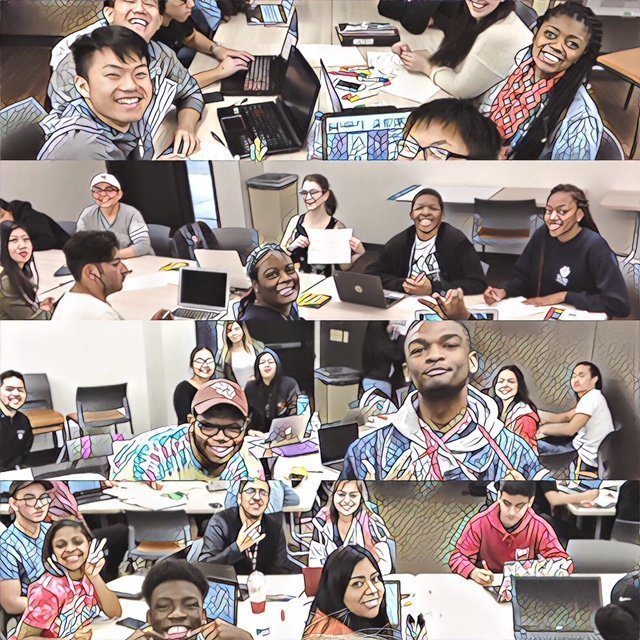

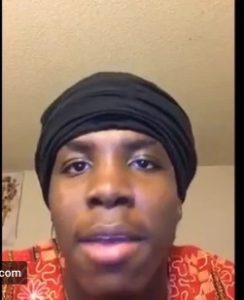 Abraham’s remixed song
Abraham’s remixed song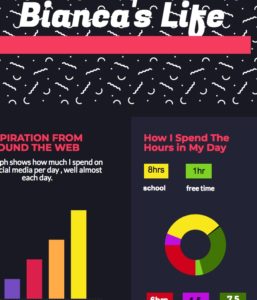 Bianca Rosa’s Pictochart
Bianca Rosa’s Pictochart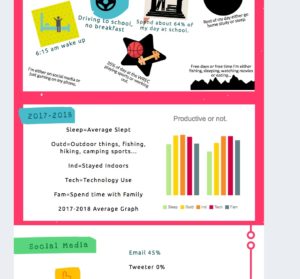 Peter Yang’s Pictochart
Peter Yang’s Pictochart